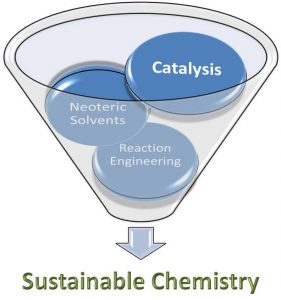
Catalysis: Selective Oxidation Reactions
We are particularly interested in developing methods for carrying out selective oxidation reactions. Oxidation reactions are often key for the synthesis of many important chemicals (pharmaceuticals, agrichemicals, fragrances and materials), however many of the established methods for carrying out oxidation reactions result in large amounts of waste and rely on undesirable reagents. Such methods are impractical as well as unsustainable; therefore there is a dire need to develop effective catalysts that utilise molecular oxygen (O2) or hydrogen peroxide (H2O2) as the terminal oxidant. We are interested the following areas:
- discovering new homogeneous (molecular) catalysts
- mechanistic studies to enable catalyst design
- developing new catalytic methodologies for organic synthesis
- addressing the problems of catalyst decomposition to improve catalyst performance (i.e. obtain high catalyst turnover numbers)
Multiphase Catalysis
The efficient separation and extended use of molecular catalysts is often crucial if new sustainable and scalable processes are to be implemented on an industrial scale. Furthermore, in the case of aerobic systems, gas-liquid mass transfer is often key in determining catalyst performance.
In order to develop catalysts which can be readily separated and re-used we are currently exploring a number of different avenues. We study the use of multiphase liquid systems such as ionic liquids, CO2 expanded solvents and supercritical CO2. We are also interested in exploiting solid materials (e.g. silica, zeolites and polymers) in order to support organometallic catalysts.
Continuous Flow Systems
The production of advanced intermediates for fine chemicals and pharmaceuticals has primarily relied on traditional batch processing, but continuous flow systems can enable more efficient and safer processes to be developed. We are part of a collaborative research project examining “Active Pharmaceutical Production in Flow” (APPFlow), see www.app-flow.co.uk for more details.
